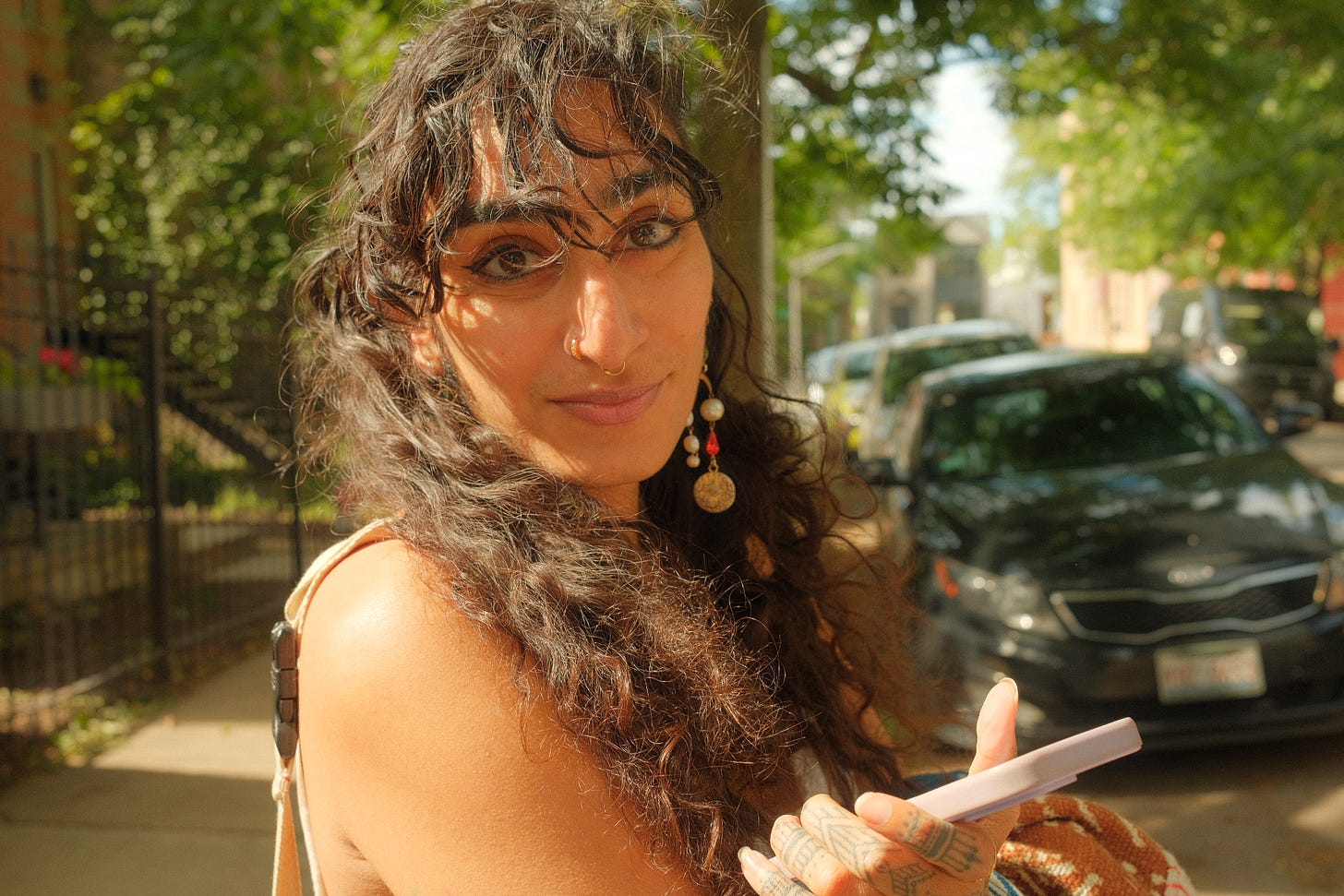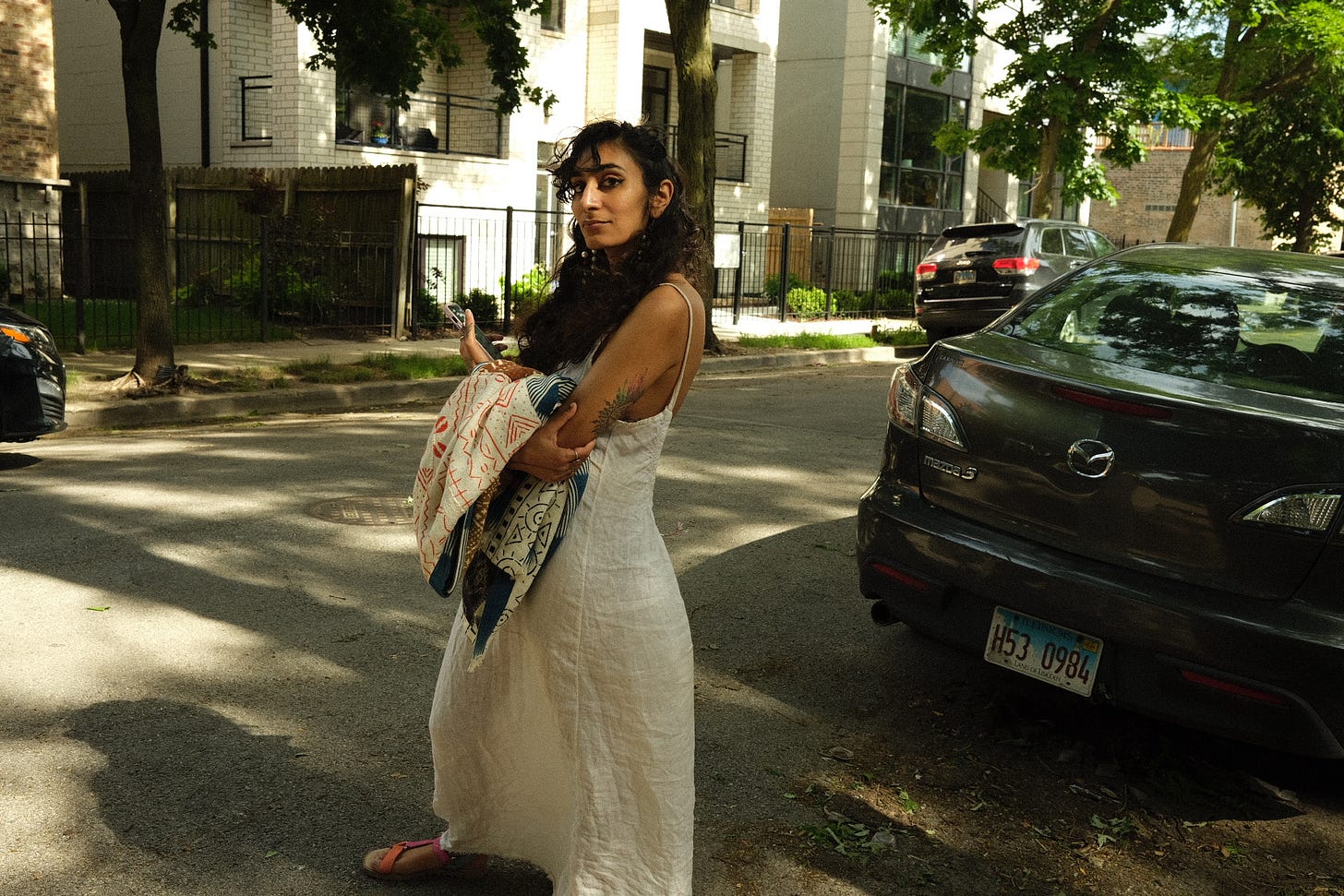This morning in prayer I felt such a deep swell of gratitude in a way that I haven’t for a long time. Gratitude for everything—for the toilet paper I was using to wipe my snot, for the trees and fibers and Earth that contributed to that little piece of toilet paper, to the synthetic rug I was sitting on for holding me and cushioning my feet, for the artisans of Pakistan for the cushion that was holding me. There’s so much pain in the world right now and for the last few weeks I’ve been so deeply feeling that pain and my own personal heartbreak that gratitude has been fleeting—it’s only come in moments where I’ve had to be really deliberate about cultivating it, about writing gratitude lists, about sitting with myself and honing in on what I’m grateful for.
But like all things, gratitude is a practice. You practice and practice it and then one day—like today—it swells all around you and consumes your being. It transforms you. In a moment of prayer you shed something that felt like an anchor before and you move into something completely different, something new, something that allows you to explore.
I don’t know that this substack entry is going to be super focused, more that I feel the need to write some thoughts that I am having that seem desperate, but to me feel connected because I am having those thoughts now all around the same time, and so want to include them. Bear with me, please.
-
I’m in a season of healing deep betrayal in my life. Betrayal is such a hard thing to hold, it shatters your world, your safety, the things you thought you were building towards. It’s also a deep step in the release of any Karmic relationship. I want to be clear—there’s so much judgement attached to things when people say ‘Karmic’ relationships, but karma, to me, is neither good or bad, it just is—the cause and effect of lifetimes, our actions, and our inactions. Right now in the world there are probably many people who consider us to have been a Karmic partner for them (think about any ex you might have had or a former friend, etc). We all exist in this world and therefore are teachers of each other. A teacher of mine told me that the steps of a Karmic relationship are often as follows:
1. Attraction
2. Stress
3. Purpose
4. Betrayal
5. Forgiveness
6. Empowerment
Normalizing the fact that betrayal happens in relationships is huge for me, as is being honest with myself about the scope of the betrayal. Some betrayals are small and can be worked through by two people, and the cycle can be transformed. Some, are not. Usually, those ones to me are the ones where the bedrock of previous betrayals are not healed, swept under the rug, and moved past without repair. Then, when a bigger betrayal happens, it feels impossible to work through together. In that moment, we need to really be honest with ourselves about what we need to get to the next step of forgiveness—if that’s not a thing we can do together, that’s okay. But I realized how important it is for me to actually be able to let a relationship go so that I can move to the next step—forgiveness—rather than bouncing back to attraction and not allowing myself the ability to move through the full cycle.
And the truth is, if we move through the full cycle, then often the first step of attraction is no longer there with the person we’re moving with. We’ve learned our lessons from each other and are no longer a match. And that’s beautiful, because we don’t need to be forcing a relationship or connection with each other.
-
In college, I remember taking a class that was looking at the way that philosophy was racialized, and specifically looking at decolonial theory. Our professor was/is amazing, and also was someone who led with a lot of intellect and not always with empathy or emotion. One day we were talking about structural racism, and a classmate of mine broke down.
In the breakdown, what I saw was—betrayal. This classmate of mine was having a visceral reaction to learning that the systems we lived in weren’t designed to protect her, to protect us, and feeling the heartbreak of that. Feeling betrayed by the world that we lived in, all of the layers of betrayal that we exist in, and having the ground shook out from under her.
I thought that my professor was going to sweep her reaction under the rug and move on. But he didn’t. He paused class, he held space for her to feel, to cry and to talk, and then he walked with her outside to his office to talk more. The tenderness that he showed her transformed the entire room, we all moved with tenderness as we were leaving. It was so helpful to actually hold and stay with the betrayal and feelings, to let it ripple through all of us, and to have a practical moment in realizing that no—this knowledge wasn’t something that you learn and move on from—it’s something that lives and rests in our bodies, and unless we tend to our bodies, it can’t be given the space to heal.
In the west, there is the thought of knowledge acquisition and academia as a place devoid of emotion, in part because of the ideas of the ‘ivory tower’. That you come to these places to acquire knowledge, to learn, but that there is some way that you are ‘objective’ and that this knowledge doesn’t touch you in subjective places, that it doesn’t transform you. We all know that’s wack, but fifteen years ago when I was in college, that was not necessarily the way that it was approached.
But I feel now on this day, and at that moment, so much gratitude for the tending to of betrayal, and for our collective moving towards forgiveness, which also meant that we had to transform ourselves to make space for each other, and to collectively decide that we didn’t want to contribute to these systems that continued to betray us and the people we love.
-
There are interpersonal Betrayal and then there are also Systemic Betrayals.
We see the example of Systemic Betrayal abundantly in our world. We see this in the ten-year anniversary of the murder of Mike Brown, and the continued rampant police brutality that dictates our world.
We see this in the way the global world has failed Palestine and the people of Gaza. I saw the story of Mohamed Abuel-Qomasan a few days ago, a man who had just had two twins and when he went to go get the birth certificate, came back home to find that Israel had bombed his wife and two children. This is one of the most tragic stories I’ve heard, and I haven’t been able to shake it. This is a betrayal of life, of humanity, of dignity that is beyond belief. This is a betrayal that all of us have to hold and have to recon with—that we live and contribute to a world where something like this can happen.
We see this in the way that the global world has also failed the people of Sudan, where the genocide and starvation of a people is beyond measure. And the global anti-Blackness and specific perverse ways that this genocide is being labeled as the ‘forgotten war’ or falling into racist tropes of civil war and ‘well those people always fight each other’ to absolve the west of responsibility, of the fact that this is a proxy war, and of complicity in the ability to turn away from something so devastating.
-
Using the six-step framework above, I’m thinking through what it means to approach systemic betrayal with agency. Often, what happens is when we feel betrayed, we seek out the system, the people, who hurt us to provide us with relief. It’s not possible. They often aren’t capable, especially in that moment. Instead, I’ve found it’s much better for me in the long run to step away, to allow the betrayal to transform me, to build with people who see the betrayal as betrayal, and to step into my own agency and moving towards building a world that I want.
It's easy to sink back into that first step of attraction—oh, but this system or person is so alluring, they allow me so much, everyone else seems to care for them. But instead, how important it is to hold your own ground and truth in—what about this allows me to be attracted to it? Does that attraction actually resonate with me, knowing the cost? And how can I move to actually building the life, the world, the community, that does resonate with my values?
-
These are nascent thoughts, just beginning. But betrayal—like all grief—can be a portal if we let it.
-
& these are some photos of my summer healing through betrayal, taken by my love Hieu Minh Nguyen




